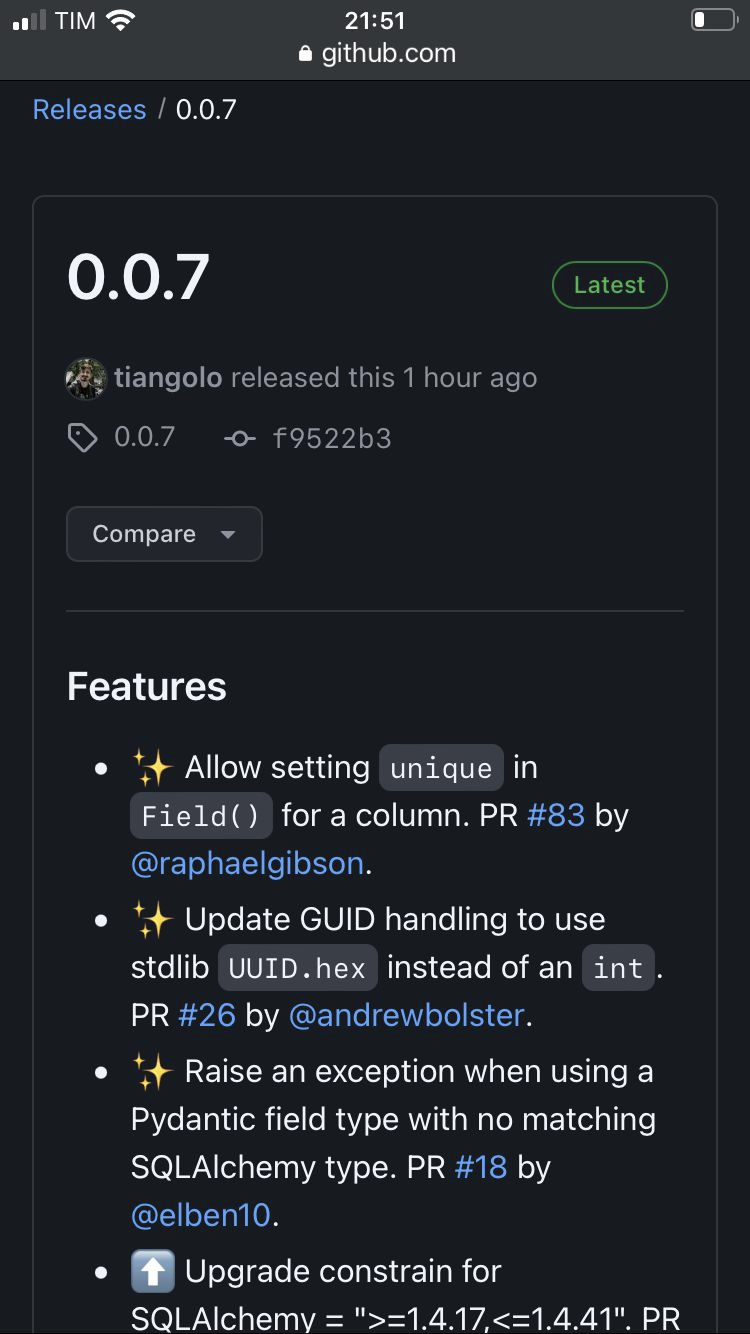-
-
Notifications
You must be signed in to change notification settings - Fork 606
New issue
Have a question about this project? Sign up for a free GitHub account to open an issue and contact its maintainers and the community.
By clicking “Sign up for GitHub”, you agree to our terms of service and privacy statement. We’ll occasionally send you account related emails.
Already on GitHub? Sign in to your account
How to define unique constraint in table columns #82
Comments
|
see #65 - it has the how to do it. Basically you specify something like - |
Thanks very much for your help, @obassett! Nevertheless, i have opened a Pull Request to use Unique constraint directly by the sqlmodel whithout using sa_column param. |
|
I had the same question, so just for documentation I put my complete example :) Hope that can help someone. So I had to define a list of product with an integer primary key id and a unique name for the products. The file from sqlmodel import SQLModel
class ProductBase(SQLModel):
name: str
description: str
price: float
available: boolThe file: from typing import Optional
from sqlalchemy import String
from sqlalchemy.sql.schema import Column
from sqlmodel import Field
from app.src.schemas.entities import ProductBase
class Product(ProductBase, table=True):
id: Optional[int] = Field(default=None, primary_key=True)
# name is unique
name: str = Field(sa_column=Column("name", String, unique=True))Of course the relationship with ProductType and ProductTagLink are defined in another files and schemas :) Hope this example helps :) |
|
Found a solution that I think is more elegant using table_args |
|
Why not simply add |
|
@StefnirKristjansson not sure that the usage of @sgraaf 's solution feels the most elegant one for single field constraints. edit: However, both my statements are pure personal preference, no solid grounds on why they would be more or less elegant :) |
|
@sgraaf : Thank you, that works fine! Where is that "trick" documented? |
|
@Data-Mastery Honestly?... Nowhere! I had to dive (deep) into the source code of SQLModel to find it. While the docs are really good in some aspects (very heavy on examples / guides / tutorials), the lack of a comprehensive API reference is very unfortunate. |
|
This isn't documented as it is a feature from SQLAlchemy, but you can define unique constraints at the model level using "table_args". So the above code would add a constraint to prevent duplicate entries in "employee_id". I've only tested this on a PostgreSQL database, but it should work fine for others. The benefit of doing it this way is you avoid having to override the column definition at the field level. https://docs.sqlalchemy.org/en/14/orm/declarative_tables.html |
|
It looks like the Field column now supports the unique=True/False keyword argument? Merged in #83 I was able to successfully use |
Yes, I have sent a PR with this feature after ask this question here. |
|
Was it removed? I am running sqlmodel version 0.3.0 and it is saying that it is not there in Field. |
Version 0.3.0? The latest version is 0.0.8, and the support for unique constraint was added on version 0.0.7 |
|
Unique constraints can be created anonymously on a single column using the unique keyword on Column. Explicitly named unique constraints and/or those with multiple columns are created via the UniqueConstraint table-level construct. |



First Check
Commit to Help
Example Code
Description
Hi, guys!
I want to define something like:
email: str = Field(unique=True)But Field does not have unique param, like SQLAlchemy Column have:
Column(unique=True)I've searched in Docs, Google and GitHub, but I found nothing about unique constraint.
Thanks for your attention!
Operating System
Windows
Operating System Details
No response
SQLModel Version
0.0.4
Python Version
3.9.4
Additional Context
No response
The text was updated successfully, but these errors were encountered: